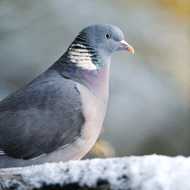Safety concerns over fenbendazole in pigeons

Fenbendazole has a low margin of safety for pigeons and overdose is likely have severe consequences.
The anthelmintic drug fenbendazole can no longer be used in pigeons under Schedule 6 of the Veterinary Medicines Regulations, the VMD has announced.
Peer-reviewed research has indicated that fenbendazole has a low margin of safety for pigeons and overdose is likely have severe consequences. These include low white blood cell count, damage to the rapidly dividing cells of the crop and small intestinal epithelium and, ultimately, death.
As a result the VMD has concluded that fenbendazole must only be used in pigeons under the direction of a veterinary surgeon and should no longer be exempt from the provisions of Schedule 6.
From 15 July 2019, fenbendazole products that list pigeons as the only target species must cease to be manufactured. Products that target a number of species must no longer list pigeons as a target species in the product literature.



 The Veterinary Medicines Directorate (VMD) is inviting applications from veterinary students to attend a one-week extramural studies (EMS) placement in July 2026.
The Veterinary Medicines Directorate (VMD) is inviting applications from veterinary students to attend a one-week extramural studies (EMS) placement in July 2026.